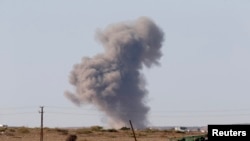The United States is calling an air campaign near the embattled Syrian border city of Kobani "useful" against the Islamic State onslaught, while pro-Kurdish protesters pleaded with governments from Ankara to Paris for greater support.
State Department spokeswoman Jen Psaki said Tuesday that airstrikes were helping fight off the ultra-radical militants who are laying siege to the town, known also as Ayn al-Arab.
"We're assisting them by doing the air strikes that we have undergone over the past several days. Certainly we've seen that has been useful, not only there but in Iraq and other places we've done them," she said.
Erdogan's warning
Turkey's president said Kobani was on the verge of falling to the IS after a nearly three-week battle with Kurdish fighters showed no signs of letting up on Tuesday.
Recep Tayyip Erdogan warned that the militant group would take control of the area along the Syria-Turkey border unless ground troops countered the offensive.
The new United Nations envoy to Syria Staffan de Mistura on Tuesday demanded immediate and "concrete" action from the international community.
"The world, all of us, will regret deeply if ISIS is able to take over a city which has defended itself with courage but is close to not being able to do so. We need to act now," he said.
Mistura said that Kurds defending against the Islamic State are very close to no longer being able to fight off the militants
The United States insists it will not send soldiers to fight in Syria. But the country is training so-called "moderate opposition" fighters to fend off IS militants, who are seizing territory in Syria and Iraq.
Turkey is under increasing pressure from the pro-Kurdish movement to use military force against the Islamic State.
Multiple humanitarian needs
As Islamic State militants continue to terrorize Iraqi civilians, the United Nations warns it is struggling to cope with the humanitarian needs of nearly 2 million people displaced by violence in that country.
The U.N.’s deputy humanitarian coordinator in Iraq, Kevin Kennedy, said Tuesday that as Islamic state militants continue trying to expand their reach in the western Anbar province, the U.N. believes 400,000 people there have become displaced from the fighting.
Add them to the more than 860,000 people who have fled to the country’s northern Kurdistan region over the past nine months and the hundreds of thousands already displaced by insecurity in Iraq and Syria and the figure soars to 1.8 million.
The U.N.’s Kennedy told reporters via a video link from Irbil that there needs to be a sustained international effort to address the growing humanitarian crisis.
“While we understand that the world’s attention is focused primarily on the very serious security situation in Iraq and the region, we believe the humanitarian situation - which is the other side of the coin - deserves equal serious consideration and the full support of all who can lend a hand," said Kennedy.
Kennedy said the U.N. and its partners are facing three major challenges - reaching those in need because they are spread among 1,500 locations in Iraq, some not under government control; a shortage of shelter, and the impending winter, which can be brutally cold, particularly in Iraq’s higher elevations.
“Our fear is, unless we can provide the shelter, and also the items to help people live through the winter, what is currently a difficult and grave humanitarian challenge will transform itself into a deadly, life-threatening situation for many of the IDPs [internally displaced persons]," he said.
Kennedy said the U.N. has an immediate shortfall of about $300 million and not enough housing for about 166,000 people. He said some of the displaced are living under bridges and out in the open and must find housing before winter starts.
United Nations Secretary-General Ban Ki-moon has expressed continued alarm about the situation in Iraq and Syria caused by Islamic State fighters. In a statement, his office said Ban is gravely concerned about the group’s offensive on the northern Syrian town of Ayn al-Arab - also known as Kobani in Kurdish, which has resulted in massive displacements of people across the border into Turkey. The U.N. chief called on “all those with the means to do so, to take immediate action to protect” civilians there.
The border town has seen intense battles in recent days as Syrian-Kurdish fighters try to drive away the terrorists. Despite intensified U.S.-led airstrikes, however, Turkey's president says the area is on the verge of falling to the militants.
Push for Turkish intervention
Protesters held demonstrations in European capitals and around Turkey on Monday and Tuesday to push for an intervention.
A monitoring group says at least 400 people have been killed in the battle for Kobani, including 20 civilians.
The Britain-based Syrian Observatory for Human Rights reports the Islamic State group has the highest death toll, with 219 members killed, while 173 Kurdish fighters have died since the clashes began in September.
The fighting has sent tens of thousands of people fleeing for safety into neighboring Turkey.
A Kurdish defense chief vowed Monday to "resist until the end," saying if the militants take the town then it will become a "graveyard" for both sides.
The Latin Patriarchate of Jerusalem also said Tuesday a Franciscan friar and 20 Christians were kidnapped from a northern Syrian town near the Turkish border earlier this week.
The Church said groups tied to the al-Qaida-linked al-Nusra front took the men Sunday from the village of Knayeh, and no contact has been made with those kidnapped or their captors.
In neighboring Iraq, Belgium joined four U.S. air strikes on Monday and Tuesday near Sinjar, where Kurdish forces are also battling Islamic State militants.
Margaret Besheer contributed from the U.N. headquarters in New York; some material came from AP, AFP and Reuters.





